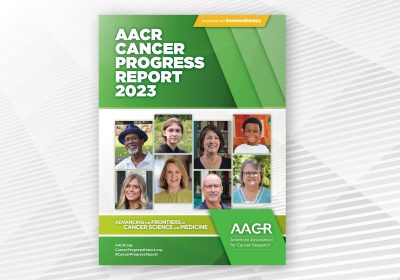
Dr. John D. Carpten: Uncovering Cancer Genetics and Striving to Include Underrepresented Populations in Research
John D. Carpten, PhD, was staring at data on a computer screen at the National Institutes of Health (NIH) in Bethesda, Maryland, in 1995. Dr. Carpten was a post-doctoral fellow in the laboratory of Jeffrey M. Trent, PhD, in the NIH’s National Human Genome Research Institute (NHGRI). He and a fellow post-doc, Jeffrey C. Smith, PhD, were analyzing genetic data for a study of 91 high-risk prostate cancer families to identify potential parts of the human genome associated with prostate cancer susceptibility.
“I suddenly sat back in my chair and wondered how many of these families were African American,” Dr. Carpten recalled. He and Dr. Smith discovered that only two or three families represented in the data set were of African American descent. “I was shocked. So many African American men are diagnosed with prostate cancer. They are about 50% more likely to be diagnosed with the disease and to die from it than are men of European descent. And this data set had so few of them.”

After his initial disbelief, Dr. Carpten was inspired and energized. “I began to make calls, reaching out to others to support me in doing a similar prostate cancer genetics study, but focused on African Americans,” he said. The discovery that African Americans were so underrepresented in the trial was a wake-up call, and it put Dr. Carpten on a course to address cancer health disparities and advocate for minority populations.
Combing through the genome-wide data from the 91 high-risk prostate cancer families, Dr. Carpten and his colleagues identified a region on chromosome 1 as a major prostate cancer susceptibility locus. The findings, published in Science in 1996, marked the first study to identify genetic variants associated with a predisposition to develop prostate cancer. “We were working on prostate cancer just as the BRCA genes were identified as major breast and ovarian cancer susceptibility genes,” said Dr. Carpten. “We have not been able to find that BRCA-like gene for prostate cancer, even with additional large studies following ours that attempted to find additional prostate cancer genes.”
Following publication of the study in Science, Dr. Carpten became an early proponent and initiator of studies on the biology of cancer in underrepresented populations. “This was a time when the purpose of my work crystalized for me. My research was always important to me, but now it went beyond academics into the realm of responsibility and purpose to represent African Americans and other minority groups in biomedical research,” he said.
Dr. Carpten began bringing together researchers and scientists to think about how to recruit African Americans into clinical trials and genetic studies like the prostate cancer study he had worked on at the NIH. One initiative was to engage with Georgia M. Dunston, founding director of the National Human Genome Center at Howard University, a historically Black university in Washington, D.C., and with the National Medical Association (NMA), a national organization representing African American physicians and their patients. Among the NMA’s leadership was Isaac Powell, MD, a urologist at the Karmanos Cancer Institute in Detroit, who helped Dr. Carpten connect with African American urologists to recruit their patients for a study of prostate cancer genetics in African Americans. “We all met at a Dulles Airport conference room [in Virginia] to discuss how to get the work done,” said Dr. Carpten. “Francis Collins was there and other leaders, but what was amazing to me was that 90% of the individuals in the room were African American. That is not something you see at most biomedical research meetings.”
In large part due to Dr. Carpten’s work, the meeting led to formation of the African American Hereditary Prostate Cancer Study, which recruited 77 African American families with at least one family member with early-onset prostate cancer. The study was the first genomic study to identify prostate cancer susceptibility genes in African Americans and has become a model of how to execute genetics research in underrepresented populations, which are often difficult to recruit. Published in Prostate in 2007, the study identified three chromosomal regions that may contain prostate cancer susceptibility genes. “Thanks to the initiative, many Black urologists became more active in biomedical research, and a number of African American trainees have become world-renowned researchers and clinicians,” said Dr. Carpten. Also, collaborative efforts have uncovered a new genetic variant that is significantly associated with familial prostate cancer, including among Black men.
Genetics “Looks Like the Future”
Dr. Carpten grew up in the South, in the Mississippi Delta, in the 1970s. He had a penchant for science, biology in particular. He also played football in high school. After graduation, he attended Lane College, a historically Black college in Jackson, Tennessee, where he majored in biology and continued playing football. In his junior year of college, he faced a decision whether to continue his education at medical school or in a graduate research program. Then he read an article in Time magazine about genetic engineering and recalls thinking, “Wow, this looks like the future.” He applied to graduate programs in molecular genetics and decided to attend Ohio State University in Columbus. “I had a mentor in college, Samuel Braxter, who was the chair of the biology department. He was a tremendous educator. After discussions with him, he gave me this advice: ‘If you get drafted to the NFL, take the money. But if not, the opportunity at Ohio State is incredible,’” Dr. Carpten said.
At Ohio State, Dr. Carpten wanted to work on a novel molecular cloning technique in which DNA vectors called yeast artificial chromosomes (YACs) clone large portions of the human genome and create libraries of the entire genome in yeast. In 1990, he became one of the first graduate students of a young faculty member named Arthur Burghes, PhD, who was using cloning to identify the gene that causes spinal muscular atrophy, a devastating pediatric genetic disorder. “I felt a little out of place. I was the only African American student in the program,” said Dr. Carpten. “Arthur really embraced me, making me feel like I belonged.” In Dr. Burghes’ lab, the young researcher screened through thousands of YACs, each containing a short segment of the human genome, to pinpoint the spinal muscular atrophy gene to a 3 mega-base pair region on human chromosome 5 in 1994.
After graduate school, Dr. Carpten began his study of prostate cancer genomics as a post-doctoral fellow in the lab of Dr. Trent at the NHGRI. In 2000, he was promoted to tenure-track professor. “I began to really think about the concept of applying our knowledge of the genome to immediate clinical applications, what we now call ‘bench to bedside’ and precision medicine,” Dr. Carpten said.

In 2003, he became the director of the Division of Integrated Cancer Genomics at the Translational Genomics Research Institute (TGen) in Phoenix. One of his first projects was to identify new cancer drug targets and novel mutations in various tumor types. Imatinib (Gleevec) had been approved in 2001 to treat chronic myelogenous leukemia, and it was among the first truly targeted cancer therapies. Cancer researchers all over the world were looking for other targetable mutations in cancer cells, hoping to develop another therapy like imatinib that would kill cancer cells. Dr. Carpten and his colleagues were collecting more than 1,000 tumor samples for drug screenings and genomic discovery studies. Specifically, a collaborative study with Eli Lilly focused on identifying overactive kinase mutations that cause cancer. By scanning kinases encoded in the human genome, Dr. Carpten discovered a recurring mutation in a kinase called AKT, which is among the most frequent ways tumor cells are able to continue dividing and surviving indefinitely. It was the first mutation associated with cancer in AKT. The AKT mutation, Dr. Carpten discovered, occurs in breast, colorectal, and ovarian tumors and activates the AKT protein, which can induce cancer in mice and can transform normal human cells into tumor cells. The study, which had important implications for identifying drugs that could target AKT, was published in the journal Nature in 2007. “The study was my first foray into tumor profiling,” Dr. Carpten said. Since then, Dr. Carpten has switched his research focus to studying the mutations that different tumors have in common, in part, to identify novel drugs that could target those mutations.
“I Know Now Why I Was Born”
By 2009, Dr. Carpten was working with colleagues on the design of precision-based cancer studies and clinical trials. In 2012, he co-founded TGen’s clinical laboratory to conduct comprehensive clinical profiling of patients’ tumors to identify possible therapies. His group performed genomic tumor profiling and developed models for molecular tumor boards, in which clinicians from cancer centers and TGen researchers would analyze tumor genetic data to help clinicians identify personalized, targeted treatments for cancer patients.
“My very first molecular tumor board meeting was on a Sunday morning because it was the only time we could get all of the clinicians together. The first cancer patient we profiled was an African American woman with triple-negative breast cancer in Texas,” Dr. Carpten recalled. “We sequenced the patient’s genome and transcriptome to identify the best therapeutic approach.
“I remember going to my office that Sunday and, after we finished the molecular tumor board, thinking, ‘I know now why I was born.’ It was at that moment that my purpose became crystal clear to me, and I really began to focus my career on applying technologies for direct clinical use. We now had this laboratory to provide tumor profiling for patients, and it was quite significant for me that the very first patient we helped was an African American woman,” said Dr. Carpten.
Advocate and Leader
Now at the Keck School of Medicine at the University of Southern California in Los Angeles, Dr. Carpten continues to develop technologies that enable a better understanding of the molecular factors that influence cancer patients’ responses to therapy. He prioritizes studies of cancers that disproportionately affect minorities, including triple-negative breast cancer, prostate cancer, and multiple myeloma. In 2017, his laboratory showed that mutations in the TP53 gene occurred much more frequently in multiple myeloma tumors from non-Hispanic white patients compared with Black patients. The large study, published in PLOS Genetics, comprehensively profiled DNA from multiple myeloma tumors and patient-matched normal samples. Among 718 multiple myeloma patients profiled, 125 self-identified as Black. “These results are important, as TP53 is a marker of poor prognosis in multiple myeloma. Among newly diagnosed multiple myeloma patients, worse outcomes historically observed among Black patients may be mostly attributed to inequalities in access to appropriate treatments, as the TP53 mutations is less likely to be found among Black patients, but of course, more work is needed to validate these findings,” said Dr. Carpten.
Dr. Carpten also continues working outside the laboratory to eliminate disparities in cancer care and disease occurrence and encourages greater minority participation in cancer clinical trials and genetic studies. He is a mentor to graduate students and post-doctoral fellows and helps provide training and career opportunities to underrepresented minority students and fellows in biology and medicine. He is quick to acknowledge that nothing he has achieved has been done alone, but only by working together with his trainees and collaborators. He is especially grateful to his mentors—Drs. Trent, Powell, and Collins; Eddie Reed, MD; Paulette Gray, PhD; and Harold P. Freeman, MD—for their support, guidance, and advice.
“For decades, the potential biological aspects of cancer disparities were very rarely addressed or discussed,” Dr. Carpten said in describing his commitment to the work of reducing disparities. “Now, finally, we have enough individuals in positions of power and influence who are finally stepping up and putting their foot down, saying, ‘Wait a minute, this is wrong.’”
Dr. Carpten appointed as chair of the National Cancer Advisory Board
On September 15, 2021, President Joseph R. Biden announced the appointment of seven distinguished clinicians and researchers to the National Cancer Advisory Board, including Dr. Carpten, who will be the chair of the advisory board. The National Cancer Advisory Board plays an important role, along with the director of the National Cancer Institute, in setting the national cancer research program. According to the White House press release, the National Cancer Advisory Board will complement the Biden Administration’s efforts to build on Cancer Moonshot, which President Biden led while vice president in the Obama Administration. As the NCAB chair, Dr. Carpten will be able to help guide cancer research efforts in the U.S.
Dr. Carpten Plays Major Roles in the AACR

Dr. Carpten has been a member of the AACR since 2003 and has been active in a number of ways. He is currently a member of the AACR Board of Directors, and in 2021 was elected a Fellow of the AACR Academy. He was the program chair for the AACR Annual Meeting 2019 in Atlanta and was a senior editor for the AACR journal Cancer Research from 2012 to 2016.
Dr. Carpten also chaired the AACR’s special-interest group Minorities in Cancer Research from 2020 to 2021, and he has been a member of the council since 2007. He chaired the steering committee of the inaugural AACR Cancer Disparities Progress Report 2020, a comprehensive overview of the latest research on health disparities that contained a call to action to overcome these disparities. In four separate years—2007, 2009, 2013, and 2020—Dr. Carpten chaired the AACR Special Conference: The Science of Cancer Health Disparities in Racial/Ethnic Minorities and the Medically Underserved.
“Interest in addressing cancer disparities and health inequity is at an all-time high,” he said. “All the major stakeholders—from academia to affected communities to government researchers—see the need to explore why cancers disproportionately affect different populations in ways that take into account both differing biology and risk factors and then use that information to find ways to mitigate them.”





